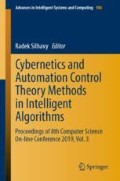Abstract
Modern information and telecommunication technologies allow not only to provide information required for training students in electronic form, they promote changes in educational process. The electronic information educational environment provides the necessary mechanism for implementing student’s individual trajectories of training. Depending on his or her learning progress the process can vary from basic to intensive, with changes in volumes of information provided. One of the approaches to developing an adaptive electronic educational course is described in this paper. The tree of concepts mastered by students is considered as a basis for knowledge component organization. The tree of concepts will allow not only to organize theoretical material of the course in the form of the separate blocks of educational information intended for studying but also to determine a necessary and sufficient set of questions for testing students.
Access this chapter
Tax calculation will be finalised at checkout
Purchases are for personal use only
References
Elliott, D., Hopfgartner, F., Leelanupab, T., Moshfeghi, Y., Jose, J.M.: An architecture for life-long user modelling. In: Lifelong User Modelling Workshop Held in Conjunction With User Modeling, Adaptation and Personalisation, Torento, Italy, pp. 1–8 (2009)
Nguyen, L., Do, P.: Learner model in adaptive learning, world academy of science. Eng. Technol. 45, 395–400 (2008)
Li, Q., Zhong, S., Wang, P., Guo, X., Quan, X.: Learner model in adaptive learning system. J. Inf. Comput. Sci. 7(5), 1137–1145 (2010)
You, D., Shen, L., Peng, S., Liu, J.: Flexible collaborative learning model in e-learning with personalized teaching materials. Adva. Intell. Soft Comput. 105, 127–131 (2011)
Jia, B., Yang, Y., Zhang, J.: Study on learner modeling in adaptive learning system. J. Comput. (Finland) 7, 2585–2592 (2012)
Jia, B., Yang, Y., Zhang, J.: Representation and acquisition of feature value of learner model in adaptive learning system. Adv. Intell. Soft Comput. 122, 371–377 (2011)
Bazhenova, K., Znamenskaya, O.: Teacher’s beliefs as a factor of individual progress of pupil. In.: European Proceedings of Social and Behavioural Sciences EpSBS, Kazan, Russia, pp. 100–108 (2017)
Hsu, W.-C., Li, C.-H.: A competency-based guided-learning algorithm applied on adaptively guiding e-learning. Interact. Learn. Environ. 23(1), 106–125 (2015)
Op Den Akker, R., Hofs, D., Hondorp, H., Op Den Akker, H., Zwiers, J., Nijholt, A.: Supporting engagement and floor control in hybrid meetings. In: Lecture Notes in Computer Science (Including Subseries Lecture Notes in Artificial Intelligence and Lecture Notes in Bioinformatics), LNAI, vol. 5641, pp. 276–290 (2009)
Kondakov, N.I.: Logicheskij slovar’ [Logical dictionary]. Science, Moscow, Russia (1971)
ISO 5963:1985 Documentation: Methods of documents analysis, determinations of their subject and selection of indexing terms
Bazhenova, K.A.: Designing educational situations for bachelor students in Pedagogics Moscow University Bulletin, vol. 3, pp. 73–83 (2014)
Rus, V., D’Mello, S., Hu, X., Graesser, A.C.: Recent advances in conversational intelligent tutoring systems. AI Mag. 34(3), 42–54 (2013)
Author information
Authors and Affiliations
Corresponding author
Editor information
Editors and Affiliations
Rights and permissions
Copyright information
© 2019 Springer Nature Switzerland AG
About this paper
Cite this paper
Tsarev, R.Y. et al. (2019). An Approach to Developing Adaptive Electronic Educational Course. In: Silhavy, R. (eds) Cybernetics and Automation Control Theory Methods in Intelligent Algorithms. CSOC 2019. Advances in Intelligent Systems and Computing, vol 986. Springer, Cham. https://doi.org/10.1007/978-3-030-19813-8_34
Download citation
DOI: https://doi.org/10.1007/978-3-030-19813-8_34
Published:
Publisher Name: Springer, Cham
Print ISBN: 978-3-030-19812-1
Online ISBN: 978-3-030-19813-8
eBook Packages: Intelligent Technologies and RoboticsIntelligent Technologies and Robotics (R0)

